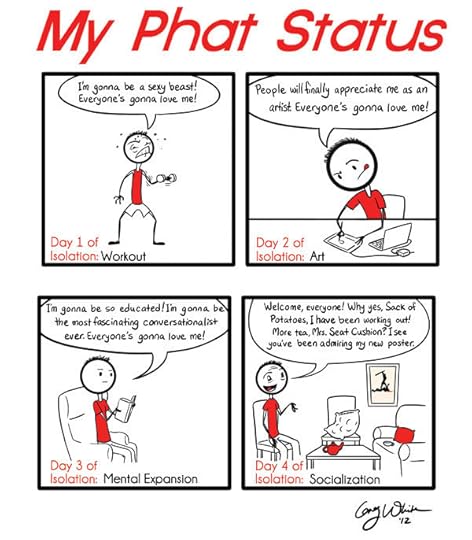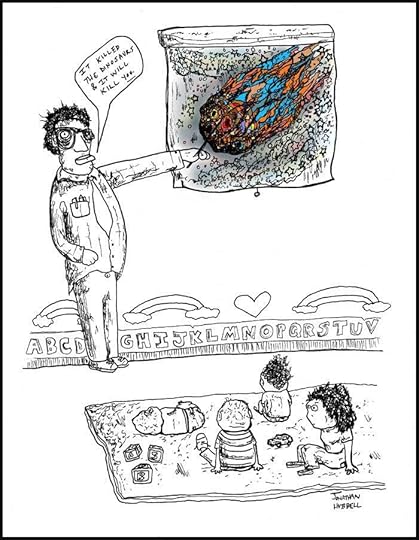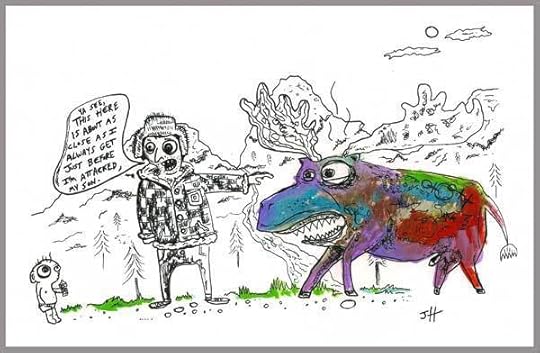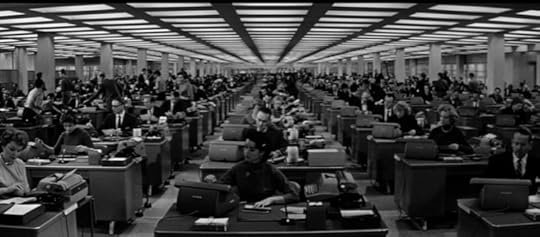Charles Martin's Blog, page 26
November 26, 2014
My Phat Status: Self-Improvement Via Depravation
November 25, 2014
This Year in Word of the Day Free Ebook
Fall 2012 through fall 2013 represents one of the most difficult transitions of my life and the Word of the Day project is the map to the resulting emotional turmoil, perhaps the most unveiled I have ever been as a writer. And you can have the eBook for free because what good is an exhaustive spiritual bleeding if no one get’s to read it? Also, I really appreciate each and every user who visits our site, so giving away This Year in Word of the Day is my way of saying “Thank you”.
The Word of the Day project began years ago while I was still married. In an effort to build my technical chops, I woke every morning to Dictionary.com’s Word of the Day email, composed a super short story and sent it off, in email form, to my wife as a way to say “good morning” since she often left for work before the kids and I awoke. Day after day, I fired off the equivalent of literary doodles. When our marriage came to an end, the project was orphaned.
After a couple months passed, I decided to restart my morning ritual, but instead of sending it to my now ex-wife, I began posting them for my family and friends. I also began spending more time on the micro-stories, polishing them a bit more, letting them breath and extend when I was really on a roll, even composing a few serialized versions. This Year in Word of the Day all comes from this time where the concept of writing a novel seemed impossible because of the emotional chaos in my life, but I still yearned to tell stories. These brief flashes of inspiration kept me sane through the first time in my adult life where I found myself alone.
Strangely, a following for my little stories emerged with pockets of readers picking up on the series from all around the world. People I would never meet, but who heard from me from a friend of a friend of a friend, started commenting on my posts. Enclaves of fans emerged and sales of my eBooks picked up. The thin, stringy World Wide Web cast lines as far as New Zealand, these strangers finding emotional connections to my tales of laboratory mice, redneck spelunkers, aged newspaper men, and heartbreak. So much heartbreak.
I fell in love with two women between the first and last posts of this series, both of them doing their best to guide me out of the dreary marsh of the recently divorced. Both of these loves collapsed. I also obtained a kind of dream job that would allow me to better manage Literati, I watched my boys continue their development into young men, I awed at the blossoming of my hometown as a cultural center, and I grappled with a deep, sometimes crippling depression.
And it made for some of the best writing of my career. Every morning for a full year, I sat aside all the day’s responsibilities until I finished a post and never missed a day no matter how ill, how hungover, or how distracted. My loved ones used the series as a way to track my emotional trajectory, often checking in when a story seemed a bit too drab, then celebrating when hope shone through. When I read back through the posts, I saw my real life mirrored with the victories, joys, and challenges re-imagined in the lives of hundreds of characters created during my morning coffee. I was also emboldened by the fact that, as dark as the times often seemed, I survived, perhaps even thrived during the Year of the Word of the Day.
epub: this-year-in-word-of-the-day
mobi(Kindle): this-year-in-word-of-the-day
pdf: this-year-in-word-of-the-day
If you prefer to purchase a copy, you can go to SMASHWORDS or AMAZON to pick up This Year in Word of the Day for only $2.99. It will also be popping up in all the major digital bookstores in the next few days.
November 24, 2014
Life Lessons 2
Turtle Priest
November 23, 2014
Pontius Pilate the Republican, or Why Mr. Obama Needs to Ignore the Bible
During his speech on immigration, President Obama referenced the Bible, and in doing so, he sounded like someone stammering through a foreign language with which he was only rudimentarily familiar. Always beware speeches that reference the King James text unless you are in a fundamentalist Baptist church. Speechwriters go for eloquence, and the KJV offers that in a Shakespearean sort of way, but it also gives away that the speaker is not familiar enough with the text to either paraphrase or use a modern version.
The verse the President cited was Exodus 23:9. He said, “Scripture tells us, we ‘shall not oppress a stranger, for [we] know the heart of a stranger.’ We were strangers once, too.” He paraphrased that last part. The text actually says, “…you were strangers in the land of Egypt.” In other words, the Jewish text reminds Israel to show empathy based on their own history; it does not articulate the underpinning of a public policy on immigration.
Just because a verse references something similar to what is at issue does not mean the text is meant to address that modern issue. In fact, it is far more likely that the text has nothing to do with the modern issue, as the Pentateuch, of which Exodus is a part, was likely finalized in the 6th century BCE. Even if that time frame is incorrect, theological conservatives argue that it was finalized much earlier, as if having a text written in the Bronze Age rather than the Iron Age makes it somehow more reliable for modern discussions of ethics and policy.
Briefly, the larger issue is why anyone needs to apply the Biblical text to political discussions in America today, since it can offer almost nothing substantive based on our current politics and context. It was written for different times and cultures, and however much conservatives may wish to believe it is timeless in its application, the text was not meant to apply to political issues in a 21st century democracy (of sorts). The issue of immigration needs to be resolved by a rational discussion of economics, human rights, and, as Obama mentioned in his speech, pragmatics.
Appeals to the Biblical text to solve this dispute are most often made by progressives, especially Jim Wallis of the evangelical-but-moderate organization Sojourners. The error, when made from the just left of center, is just as theoretically wrong-headed as when it is made from the far right of center. Absent a god who can be troubled to show up and tell us what He really thinks, we only take theists at their word about “thus sayeth the Lord”.
In fact, political conservatives likely want god out of this discussion, because most of the New Testament ethos is going to militate against the conservative position. It militates against almost all conservative positions, but conservatives only need Jesus to save them, not tell them how to live. They will likely cite Romans 13 about obeying the “law of the land,” but we should remember that they have supported deposing autocrats, torture, rendition, assassination, segregation, and the separation of families in the name of law and order, and in the case of wars, in direct violation of the laws of other lands we have invaded. Law, it seems, is more contextual than conservatives wish to admit.
In the case of immigration, they are ignoring Paul, who is normally the darling of the Right. I have no idea if Paul was the first to propound this idea, but his version is the best known: the spirit of the law matters far more than the letter of the law. It is possible to obey or enforce the letter of the law and miss the intent behind the law. Immigration provides a rich opportunity for conservatives to insist their more base emotions are really just respect for the law. They are not subtle (or overt) racists; they are law-abiding citizens. They are not xenophobes; they are Americans who want to protect the American way of life (whatever the hell that means). They are not beneficiaries of white privilege; they are champions of justice in the form of “get in line,” as if they ever stood in a seven, fifteen, or twenty-five year line.
More than anything else in this discussion, the ignorance of all sides about the causes of this crisis is distressing. Illegal immigration has not always been a problem on this scale. The Pew Center reported that illegal immigration was at about 130,000 per year throughout the 80′s, increasing to nearly half a million per year in the early 90s, and finally stabilizing at three-quarters of a million to one million per year following 1995. The North American Free Trade Agreement was signed in 1994, but that is surely just a coincidence. The crazy little Texan Ross Perot warned Americans that NAFTA would be bad for manufacturing, but nobody told Mexico and Latin America that, following decades of intentional destabilization by the U.S. (CIA, drug interdiction, support for fascists, assassinations, etc.), their countries’ economies would be eviscerated and their assets made available to greedy multinational corporations. That was just another unhappy side effect, and one that accelerated the rate of illegal immigration, or if you lived in those countries, necessary emigration in order to survive. I will be expanding into this failed immigration policy in a future post.
Americans, especially conservatives, wash their hands of the whole affair–and isn’t it odd how they increasingly take on the guise of all the Bible’s villains–and think the brown people just want to come to the “greatest country on earth.” I have often lamented the loss of Mr. Vonnegut. Were he here today, he could surely make of this a wonderful story line. After all, it’s rare that life parodies itself quite so effortlessly. Immigration reveals that all American politics has the form of satire, but the redemption normally provided by satire is absent, as is the self-awareness offered by the mirror held aloft by the humorist.
November 20, 2014
Learning from a Rock Star’s 20,000th Day
20,000 Days on Earth
November 20 & 22
Oklahoma City Museum of Art Noble Theater
415 Couch Drive in OKC
(405) 236-3100
okcmoa.com/see/films/
20,000 Days on Earth defies easy categorization. We are taken on a journey through the life of iconic, post-punk musician and polymath Nick Cave in what, on one level, documents the everyday sights and sounds of Nick Cave and the Bad Seeds laboring their latest album Push the Sky Away in its incubation stage. But, it is also layered with surreal dramatic scenes where Cave plays an abstraction of the character and the real person “creating a world,” narrating the script from afar.
We dive deep into the rich world of tragic, visceral beauty that Cave has spent a career creating rather than looking for some glimpse of truth behind the music. Cave is very aware that the rock star is an invention. It is a role played on a stage and it is all we ever really have the right to know anyway. In contrast to the drug-addled interviews I have seen from his youth, where interviews were an act of masochism, it is a treat that an older, more agreeable Nick Cave is finally giving more insight into his process and what makes him, as an artist, tick.
The scenes sometimes feel like intentional allusions to familiar themes within his vast body of work. Throughout the film, Cave visits with a therapist where we are taken deep into Cave’s mind to explore his obsessions with weather, an idealized woman with black hair and a pale face, his interests in the deviants of society, and his complicated relationship with religion. By the end of the film I felt I had been provided a road map to the fictional world of his music, film and prose.
But, his philosophy on the creative process itself seems to be the real subject of this unique film. He claims all songwriting to be “counterpoint.” The wrestling of two forces to see what kind of transformation will occur is integral to his process. In a revealing scene he explains that losing his memory is his greatest fear. These memories, he says, define who we are. They have served as the actors within his musical narratives, morphed into something outside of reality through his blending process. It is evident that the retelling and mythologizing of memories are a crucial ritual to his existence.
And he holds a great deal of reverence for live performance, where he is able to live within and share this world with the audience. Intimacy with the crowd seems vital to his own experience. I recall seeing a show where Cave stopped mid-song to kick out the security staff at a Dallas venue because they were prohibiting the audience from approaching the stage. At first, I thought this was something he did for the fans, but after hearing him talk about how he views performance as a communal affair, I think this was for his own benefit. He engages with the front rows directly, often singling out a person to make a personal connection.
In the film, he speaks in awe of seeing jazz legend Nina Simone during a time when she came across as an unhinged and menacing presence on stage. We also hear musical collaborator, Warren Ellis talk about the wild, animated “Killer” Jerry Lee Lewis turning a dull opening into a riotous show with his chaotic energy. These shows stick out in the mind of Cave and the fellow members of his Bad Seeds. From the violent music of the Birthday Party that often caused fights at shows to the jarring imagery of songs like “Stagger Lee”, there is no doubt that they see the transformative power of the terrifying mask.
Cave gave directors Iain Forsyth and Jane Pollard room to make the film they wanted while maintaining a lot of control over how he is portrayed. There is a lot of honesty and this does not ever feel like the kind of rise, fall, and triumphant return thematic arch a lot of bio-pics have given us.
There are three scenes where Cave rides with important people from his past. We hear the reflections of actor Ray Winestone, from Cave’s film The Proposition speaking about age. In Cave’s reaction you feel the somberness of someone who is aware of his fragile mortality and limitations. There is a candid scene with longtime Bad Seed member Blixa Bargeld explaining the reasons for abruptly quitting the band in 2003.
Cave chauffeurs fellow Australian singer Kylie Minogue through the rainy streets of his adopted home of Brighton, England. Her presence in the back makes her feel like a distant but precious memory from his past. Kylie recorded on the song “Where the Wild Roses Grow” on the Bad Seeds album Murder Ballads in 1996. She is surprisingly forthcoming in her fears of being forgotten, giving her own perspective to the ongoing theme of the fragility of memory.
But, beyond being a trip through Cave’s life, I find a lot of value can be taken if viewed as a film about being an artist. We see the steps taken in turning fragments of ideas into inspiring works of art. Perhaps we can all find some lesson for our own creativity from this quasi-fictional 20,000th day in the life of Nick Cave.
Life Lessons
November 19, 2014
Obamacare, Art, and Price Gouging
America is risk. That is the heart of this country, the implication of our collective Dream that we are taught to ascribe to as children. America is freedom. Freedom is risk. Therefore, risk is America.
In the heart of the Affordable Health Care Act debate comes the assertion that the program is inherently un-American because of the individual mandate. I propose, to the contrary, that by shifting the burden of health insurance from the backs of employers to the government, we are freeing up prospective entrepreneurs, allowing for a new wave of risk-taking as some of the country’s best and brightest minds are allowed to leave corporate America to search out opportunities for themselves. Open enrollment runs through February 15 with all eyes on the performance of healthcare.gov, which stumbled last year as high volume traffic caused repeated crashes. The site has handled the heavy volume better the second time around with over one million visitors in its first two days. Problems are still popping up, including issues with existing log-in info (which I encountered) and glitchy state marketplaces, but nothing compared to the meltdown of 2013.
This is the nature of health insurance, unfortunately. No more or less a headache than when I purchased it through an employer. The only difference is the acrimony over delays is directed at a government entity rather than hapless Human Resources Reps. Yet, I adore this program because it has allowed me to take a great risk with my life, to find my own version of the Dream and, in so doing, leave the comforts of traditional employment.
Regarding corporate America, I do not fault anyone who chooses the safety of multi-billion dollar employers able to weather recessions better than the volatile existence of small businesses. I often consider how much easier my life would be if I returned to the corporate path. I could install myself inside a cubicle, grind out forty hour work weeks at a job I despise while I claw my way up to progressively larger and better situated offices. With that corporate job comes the much heralded benefits of 401K’s, vacation days, and health insurance. They seem like treasures at first, but soon become chains that discourage risk-taking. How can one start their own business when that means leaving those benefits behind?
My breakthrough arrived when I found an opportunity to work a part time job that yielded enough income to then allow me to shift my focus to this publishing company. ACA then allowed me to find health insurance on my own so I would at least have some protection should a medical emergency arrive. It would be nice if Literati became a media empire able to provide me with all the benefits of a traditional employer, but that is not really our mission. I always envisioned Literati being a platform where ambitious writers and artists can begin building their portfolios so that, once they’ve established their readership, they can advance upstream to larger publishers with the resources to push these talented storytellers onto the national stage. There is not a lot of money to be made in the mentoring business, but this is what satisfies me, this is where I can make a difference in Oklahoma and help improve our creative community.
Being able to purchase quality and affordable health insurance from a government-run marketplace allows me to take this risk. I don’t expect everyone to follow suit, but there are many like myself who need n0n-traditional employment to realize their potential in a number of different industries. America needs the corporations just as it needs the entrepreneurs. ACA is a tool that allows for the freedom to choose our own path.
Universal coverage is not a magic bullet for the health care industry. There are other problems that need different approaches, primarily the soaring costs. Tools for pricing transparency will likely become an important factor in getting health care costs under control. Opscost.com allows users to compare the costs of specific procedures at medical providers in their area. I did a search on “spinal fusion operations with no complications” and found that the billing cost varies from $51,893 at the McBride Orthopedic Hospital to $100,926 at the Oklahoma Heart Hospital. These are both located in Oklahoma City. This wide price gap was typical of other procedural searches I made. The disparity is not entirely price gouging. Differences in care and uses of costly new technologies that increases odds of successful procedures also factor into the final bill, but it would be foolish to think that hospitals aren’t benefiting from an ill-informed customer base.
Conservative opposition and state-run efforts to kill the program are ongoing, but as long as the Supreme Court doesn’t gut the bill on a technicality, President Obama will shield his signature program from the Republican controlled legislature. Then we will have a new presidential election in two years which will likely favor the Democrats. Republicans know that the clock is ticking on their chance to overturn ACA and, once Americans have acclimated to pseudo-socialized health care, they will become more resistant to giving it up. Should ACA be overturned, then millions of newly-insured Americans will soon find themselves unable to afford health coverage, myself included, and be forced back into the corporate workforce or to roll the dice and hope that they never get sick or injured again. This will hurt the innovators and the risk-takers, it will discourage entrepreneurs and strip quality employees from small businesses that are unable to provide benefits. The American Spirit will be diminished in favor of a homogeneous workforce.
Hopefully, as ACA is given time to show its worth, the program will be improved to take advantage of new ways to help Americans acquire quality health care without mortgaging their livelihoods. Republican opposition will fade to just a fringe battle cry, and the quality of life for Americans will tick up a few more notches. Universal health insurance has been a long-delayed progression in American life and ACA will likely look much different in years to come, but it was a milestone for our nation and will provide our worker’s, artists, business-owners, and students the flexibility to realize their own unique destiny while forging a stronger, more sustainable economy in the process.
November 14, 2014
Learn How To Draw Comics With Don “Literati” Rosencrans!!!
8-10 pm
District House
1755 NW 16th St in the Plaza District
In an effort to encourage our growing comic book community, “Welcome to Ralton” artist Don Rosencrans will be starting a mentoring program at the District House. He will be teaching the basics of layout, penciling, story development, and other tricks of the trade. The event is free and open to the public. Creators of all ages are welcome to come and go as they please. The event corresponds with the monthly Live on the Plaza, so there will also be ample opportunities for early Christmas shopping.
Meat Quest
Editor’s note: Greg is talented. Like super talented. His My Phat Status is still ongoing, but we thought we’d start bringing in some of his faux-book covers because they make us smile. Enjoy. 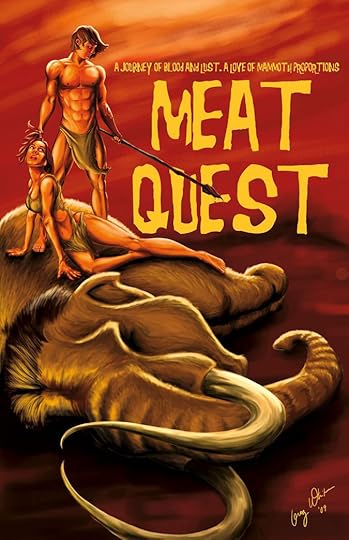 Artist’s statement: One of the biggest challenges for this piece was that every title and tag line I came up with made it look more like a cheesy dime store romance novel cover than a pulp magazine. I’d hoped the mastodon carcass and general over-the-topness of the image would make it more obvious, but I still think it has a touch of the Fabio factor that just won’t wash out, no matter how much blood and misogyny I pour on it. But I’m okay with that. It’s sort of the result of a late night impromptu photo shoot I did with some friends at my place a while back, during which I promised to do a poster for each of the attendees (myself included). And no, the models did not strip down to loin cloths. I had to make believe the muscles and belly buttons.
Artist’s statement: One of the biggest challenges for this piece was that every title and tag line I came up with made it look more like a cheesy dime store romance novel cover than a pulp magazine. I’d hoped the mastodon carcass and general over-the-topness of the image would make it more obvious, but I still think it has a touch of the Fabio factor that just won’t wash out, no matter how much blood and misogyny I pour on it. But I’m okay with that. It’s sort of the result of a late night impromptu photo shoot I did with some friends at my place a while back, during which I promised to do a poster for each of the attendees (myself included). And no, the models did not strip down to loin cloths. I had to make believe the muscles and belly buttons.
PREVIOUS/NEXT

